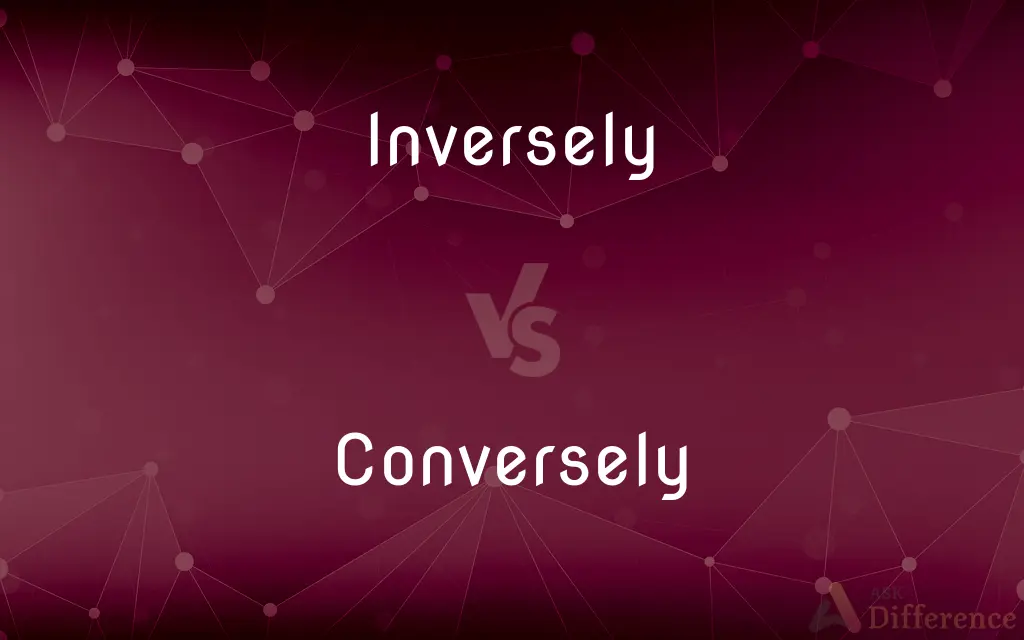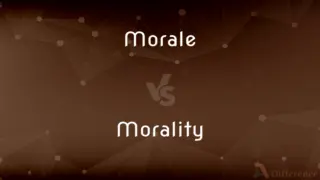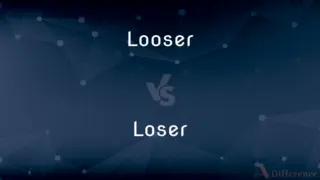Inversely vs. Conversely — What's the Difference?
Edited by Tayyaba Rehman — By Maham Liaqat — Updated on February 22, 2024
"Inversely" relates to a direct opposite in position, order, or relationship, often used in mathematical or technical contexts. "Conversely" indicates a contrast or reversal in conditions or circumstances, commonly used in argumentative discussion.

Difference Between Inversely and Conversely
Table of Contents
ADVERTISEMENT
Key Differences
"Inversely" is primarily used to describe situations where one variable changes in the direct opposite manner to another, a concept often encountered in mathematics and physics. For instance, in the inverse relationship between the volume and pressure of a gas at constant temperature (Boyle's Law), as one increases, the other decreases. This term underscores a specific kind of relationship where elements are mirror opposites in function or position.
"Conversely" is used to introduce a statement that contrasts with the previous one, highlighting a reversal in conditions or viewpoints. It is a transitional word that helps in making arguments, drawing comparisons, or discussing alternate scenarios. For example, while one might argue that technology simplifies life, conversely, it can be argued that it complicates traditional ways of living.
The application of "inversely" often involves quantitative relationships, where a mathematical or logical inverse is present. This term is less about contrasting ideas and more about describing a specific type of reciprocal relationship. "Conversely" is more qualitative, used to present opposing views, conditions, or outcomes, enriching a narrative or argument by examining different angles.
Understanding the context in which each term is used is crucial. "Inversely" suits discussions involving scientific principles, formulas, or any scenario where things move in opposite directions in a linked manner. "Conversely" fits into debates, essays, and discussions where contrasting ideas or scenarios are being explored, providing a linguistic tool to pivot from one viewpoint to another.
Both terms serve to illustrate the relationship between two or more elements, but they do so in different ways. "Inversely" implies a mathematical or logical opposition, whereas "conversely" introduces a contrast in ideas, scenarios, or statements, enriching the discourse by acknowledging multiple perspectives.
ADVERTISEMENT
Comparison Chart
Usage Context
Mathematical, technical, or scientific scenarios
Argumentative, comparative, or discursive texts
Relationship
Describes a direct opposite quantitative relationship
Indicates a contrast or reversal in ideas or conditions
Examples
Inverse square law in physics, inverse relationships in mathematics
Contrasting viewpoints in an argument, alternate scenarios in discussions
Function
Highlights reciprocal quantitative changes
Introduces contrasting qualitative statements
Application
Specific to scenarios with a mathematical or logical inverse
Broadly used in discussions, arguments, and comparative analyses
Compare with Definitions
Inversely
Directly opposite in relationship or effect.
The speed of a vehicle is inversely proportional to its travel time for a fixed distance.
Conversely
Showing an alternative perspective.
Urban areas are bustling with activity; conversely, rural areas offer tranquility.
Inversely
Reciprocally related in mathematics.
In a function, y is inversely related to x if y = k/x.
Conversely
Introducing a contrasting statement or idea.
Some see technology as isolating; conversely, others believe it connects people more than ever.
Inversely
Opposite in order or sequence.
The brightness of a light bulb is inversely related to its resistance.
Conversely
Highlighting a reversal in conditions.
Wealth can buy convenience; conversely, it may bring complexity.
Inversely
Characterizing an inverse variation.
The pressure and volume of an ideal gas are inversely related under constant temperature.
Conversely
Contrasting two different scenarios.
Manual work is physically demanding; conversely, intellectual work is mentally taxing.
Inversely
Reflecting a reverse position.
As investment risk increases, the safety of the investment inversely decreases.
Conversely
Indicating the opposite side of an argument.
Optimists see challenges as opportunities; conversely, pessimists may see them as insurmountable obstacles.
Inversely
The reciprocal of a designated quantity. Also called multiplicative inverse.
Conversely
In a converse manner; with change of order or relation; reciprocally.
Inversely
(Mathematics) Of or relating to an inverse or an inverse function.
Conversely
Reversed, as in position, order, or action; contrary.
Inversely
In an inverse order or manner; by inversion.
Conversely
From another point of view; on the other hand.
Common Curiosities
How does "conversely" enhance an argument or discussion?
It introduces contrasting viewpoints or conditions, enriching the discourse by acknowledging and exploring different perspectives.
Why is understanding the difference between "inversely" and "conversely" important?
It ensures accurate communication, especially in academic, scientific, or discursive writing, by correctly conveying relationships or contrasts.
Is "inversely" only used in scientific contexts?
Primarily, yes, as it often describes mathematical or logical inverse relationships, though it can be used metaphorically in other contexts.
Can "inversely" and "conversely" be used interchangeably?
No, because "inversely" implies a direct opposite quantitative relationship, while "conversely" is used for contrasting ideas or conditions.
How do "inversely" and "conversely" contribute to clear writing?
By providing specific terms to describe opposite relationships ("inversely") and contrasting ideas ("conversely"), they enhance clarity and precision in communication.
Does "conversely" imply a direct opposite?
Not necessarily a direct opposite, but rather an alternative or contrasting scenario, idea, or condition.
Can "inversely" be used in everyday language?
It can, especially when describing situations where there's a clear reciprocal or opposite relationship, though it's less common outside technical contexts.
Can a situation be described as both "inversely" and "conversely" related?
Yes, in contexts where there's a quantitative inverse relationship and also a qualitative contrast in scenarios or ideas.
Is "conversely" a formal term?
It can be used in both formal and informal contexts, wherever contrasting ideas or scenarios are being discussed.
How do "inversely" and "conversely" relate to cause and effect?
"Inversely" can describe a cause-and-effect relationship where the effects are directly opposite, while "conversely" can introduce an alternative effect or scenario.
Can "inversely" apply to non-quantitative relationships?
While typically used in quantitative contexts, it can be metaphorically applied to situations where there's a clear opposite relationship.
Can "inversely" refer to spatial relationships?
Yes, in contexts where two elements are positioned in direct opposition or mirrored arrangement.
How do non-native English speakers differentiate between "inversely" and "conversely"?
Understanding the context and specific relationships each word describes is key, with "inversely" often used in technical contexts and "conversely" in argumentative or comparative discussions.
Are there synonyms for "inversely" and "conversely" that can be used interchangeably?
Synonyms exist (e.g., "oppositely" for "inversely," "on the other hand" for "conversely"), but their use depends on the specific context and desired nuance.
How do "inversely" and "conversely" affect the tone of a text?
"Inversely" can introduce a technical or precise tone, while "conversely" can make the text more engaging by presenting alternative viewpoints or scenarios.
Share Your Discovery

Previous Comparison
Morale vs. Morality
Next Comparison
Looser vs. LoserAuthor Spotlight
Written by
Maham LiaqatEdited by
Tayyaba RehmanTayyaba Rehman is a distinguished writer, currently serving as a primary contributor to askdifference.com. As a researcher in semantics and etymology, Tayyaba's passion for the complexity of languages and their distinctions has found a perfect home on the platform. Tayyaba delves into the intricacies of language, distinguishing between commonly confused words and phrases, thereby providing clarity for readers worldwide.













































